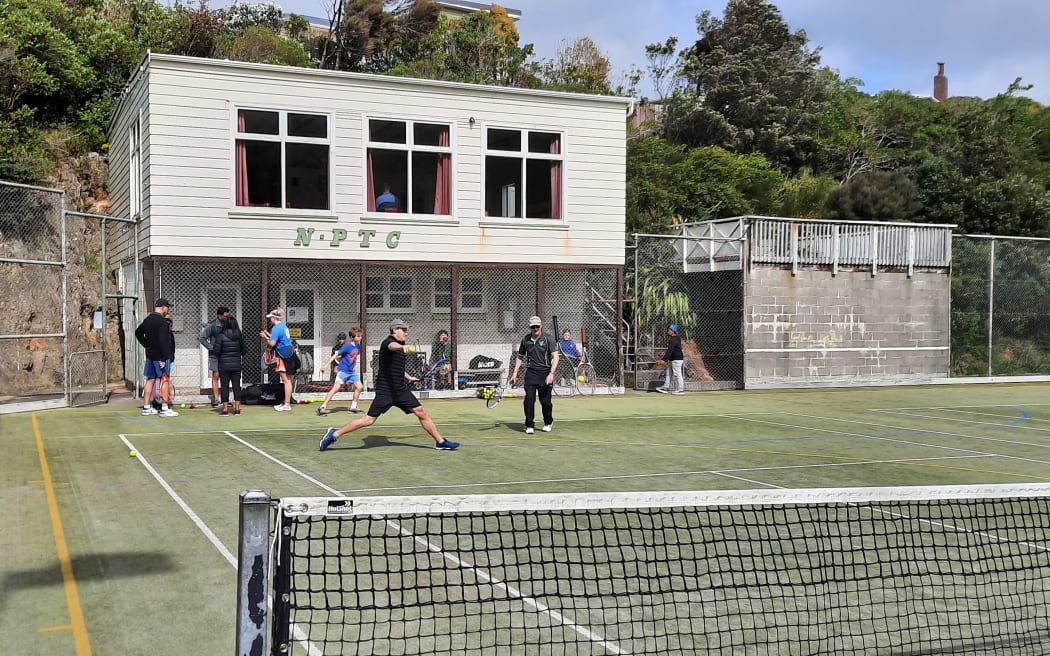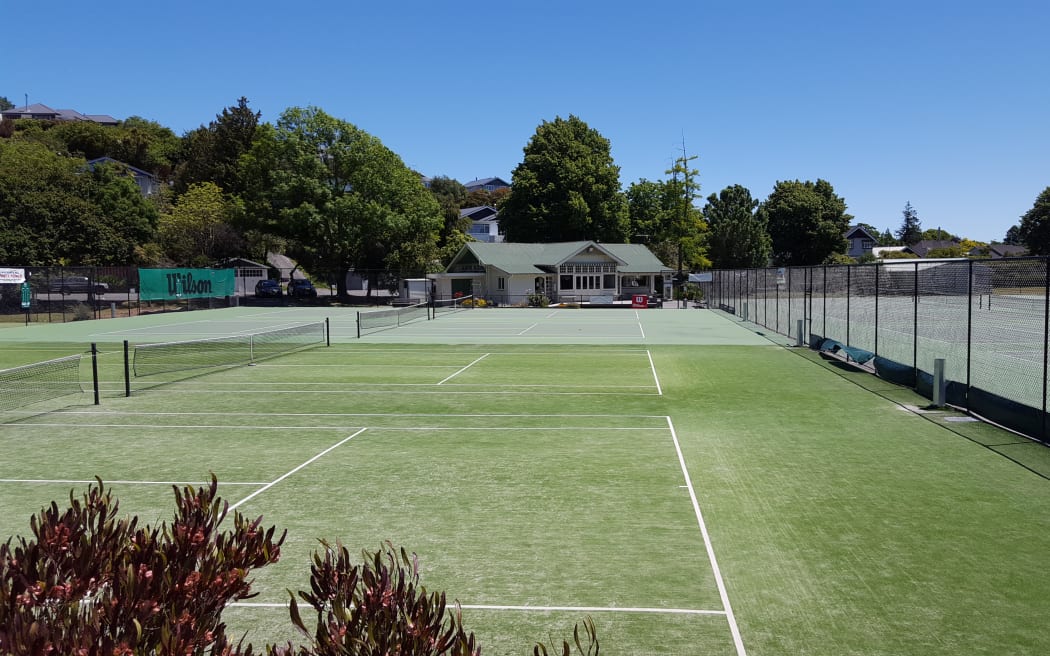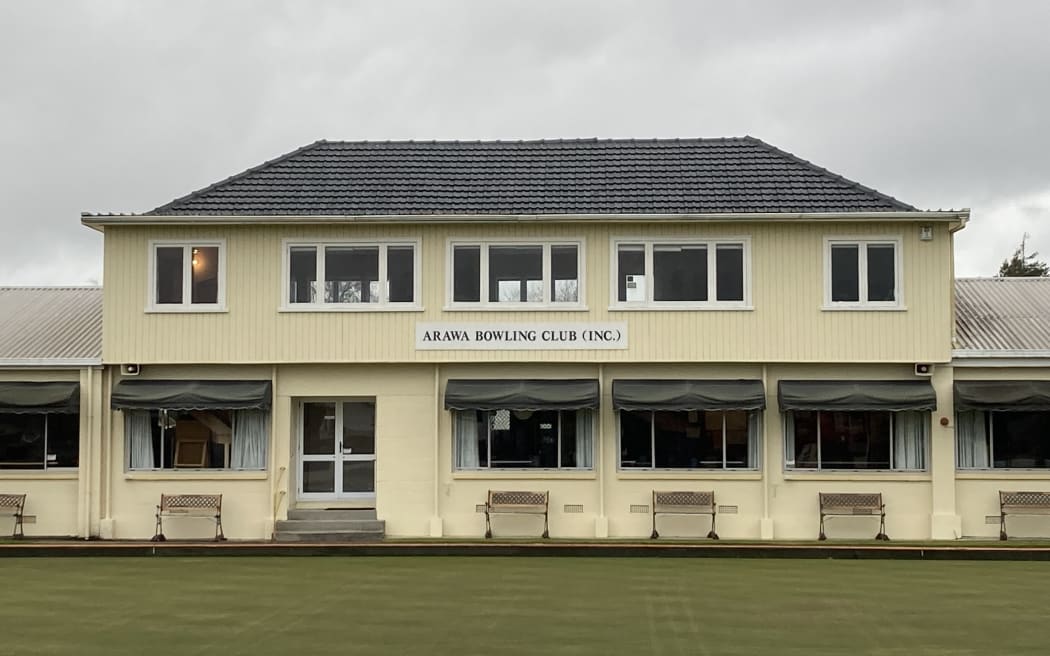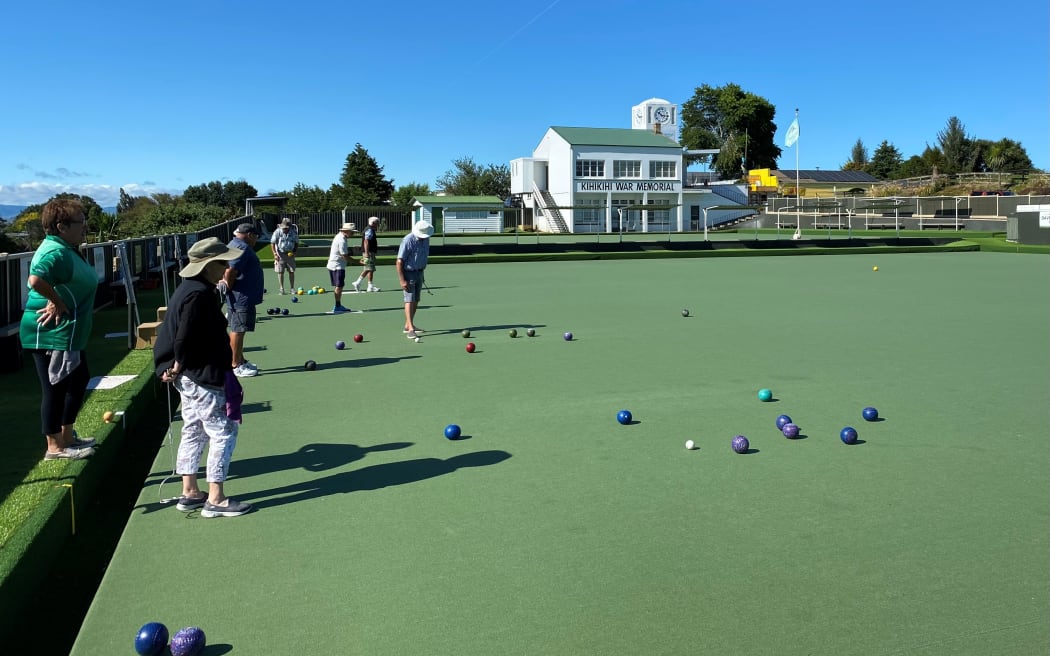
Newlands-Paparangi Tennis Club in Wellington is one of thousands of sports clubs around the country that will have to re-register. Photo: RNZ / Bridget Tunnicliffe
If you're on the committee of your local sports club and you think running a club is hard enough already, it's about to get harder.
Incorporated community sport organisations (ICSOs) have until the April 2026 to re-register under the new Incorporated Societies Act 2022, or face involuntary dissolution.
Chair of the New Zealand Amateur Sport Association, Gordon Noble-Campbell, said the Act imposed more obligations on volunteers and will push more clubs into extinction.
"And that is real threat to the well-being and the fabric of community sport, which New Zealand can't afford to let happen," Noble-Campbell said.
The Association lobbied the previous government about the implications of the new legislation on volunteer-led sports clubs, but it seems to have mostly fallen on deaf ears.
It has run several seminars around the country explaining to people their obligations under the Act, which seems to have caught most off-guard.
The new legislation caters for big organisations with millions of dollars and hundreds of employees like the New Zealand Rugby Union but Noble-Campbell said it was not fit for purpose for small volunteer-led not for profit organisations.
"When you talk about the Ōkato Tennis Club for example, they simply don't have the capability to be able to deal with the new law, which effectively creates a corporate type compliance environment.
"People are saying that they don't think they've got the knowledge and skills to be able to cope with the changes required."

Cashmere Tennis Club in Christchurch is one of many clubs in the country that relies on volunteers. Photo: RNZ / Conan Young
The Association said incorporated community sport organisations were already dissolving at an alarming rate.
It has been monitoring the dissolution rates for about the past five years.
In the 12 months to November around 340 community sport organisations were dissolved, and not subsequently restored.
He said in some instances clubs have no idea they have been struck off and it can be as a result of forgetting to file annual financial statements.
"Based on our database, we think there's about seven and a half thousand community sports organisations around the country, most of which will be incorporated."
The new Act comprises 270 sections, compared to 36 sections under the old Act.
Clubs will have to rewrite their constitutions and include additional procedures, like dispute resolution processes.
Any person wishing to join a club will have to formally consent to become a member and a register has to be kept of all members.
There are also new rules around the qualification of officers of a sports club. A candidate has to confirm their consent in writing and their qualification to be appointed.
"It's already a challenge to get people to stick their hand up to fill positions on committees. They are going to need to complete a form, which confirms their qualification to be able to act in that capacity. This will be a deterrent for people to step forward."
Krystyna Beardman is on the committee of the New Plymouth Roller Sports Club and has been involved in the club since 1996.
"Our club is totally volunteer based, we don't have the finances to get legal opinions on the constitution and all that so we'd have to rely on people in the club but most of them just want to play sport, they're not really interested in the paper work," Beardman said.
"There's quite a few changes that we will have to make to our structure and constitution to meet the requirements of the Act. We also own our own building so funding is a huge issue for us in terms of maintenance - that's our priority."

Rotorua's Arawa Bowling Club is one of many bowling clubs in New Zealand. Photo: RNZ / Leonard Powell
The Association, which presented a submission at the select committee stage, had some success in getting rid of some of the more onerous financial reporting obligations for smaller clubs.
Incorporated societies must file a copy of their financial statements with the Companies Office each year.
As of last month incorporated societies that are not registered charities have to use the External Reporting Board (XRB) accounting standards when preparing their financial statements, unless they qualify as a "small society".
That threshold is set around having less than $50,000 in operating payments and assets less than $50,000 in the preceding accounting periods.
But Noble-Campbell said many clubs would still need professional help.
"To certify you are a 'small society' your club will probably need somebody with some accountancy background to undertake that assessment for you.
"And if you're over the threshold, then you'll probably have to enlist the help of an accountant."
Clubs will need to ensure their new constitutions meet all the mandatory requirements of the Act when they re-register with the Companies Office.
"It is likely you will need to get a pair of legal eyes to look over that before you submit it in the event the registrar says it doesn't meet the requirements."

Gordon Noble-Campbell Photo: supplied
Sport Manawatu's Community Partnerships Advisor David King said it was going to be quite a demanding process for volunteers.
"It is an opportunity to review their constitutions and bring it into the modern world to try to cater for the needs of the community but the legislation hasn't made enough allowance for the differences between very large scale incorporated societies and very small scale incorporated societies," King said.
He said the April 2026 deadline didn't give clubs a lot of time.
"If they submit their constitution and it's rejected because it hasn't met the requirements, they have to start all over again, then resubmit it - so that timeframe is going to go by very quickly on them."
Noble-Campbell said the legislation was rushed through parliament without sufficient discussion to ensure it avoided unintended consequences.
Earlier this year the government decided to scrap public consultation on the regulations, until the Association asked for an explanation.
"Then a 10 day window was opened and the Association went through all the regulations and provided feedback. All we got was a standard reply thanking us for our feedback."
Noble-Campbell said if clubs lose their incorporated status then it became a risk to the people running those organisations, in terms of their obligations under law.
"We've arrived at this place where grassroots community sports people are putting their hands up in the air asking 'what's happened? The people coming to the seminars are the ones who are at least aware that a change has happened.
"The real fear is that the majority of community sports organisations are completely ignorant of the changes or they're choosing not to engage because it's far too difficult and their biggest job is delivering sport to their community."

Kihikihi Bowling Club in Waikato Photo: RNZ/Leah Tebbutt
Noble-Campbell would like to see Sport New Zealand do more to support grassroots sport.
"They need to make some of the extensive funding it receives from the government available to grassroots sport organisations so they can contract the necessary legal and accounting resources to help them navigate their way through the new Act.
"Regional sports trusts, which are funded by Sport New Zealand, are inviting us to present our seminars on how to navigate the new legislation.
"Sport New Zealand is focussing on big broad themes like Play Week and stuff like that and not actually on the grassroots infrastructure around how organised sport is delivered to communities and that is just bizarre.
"Not to say that they are not doing good things but the focus is not right. Sport New Zealand does not deliver sport to local communities, sport clubs do - they are the backbone."
But Sport New Zealand CEO Raelene Castle said the crown agency did not have a direct role in supporting community sports clubs.
"Our role is to engage with the National Sports Organisations ...we have been doing a lot directly with the NSOs so that they ultimately can give the right advice to their clubs in the community."

Sport New Zealand CEO Raelene Castle Photo: RNZ / MARIKA KHABAZI
Castle said it was trying to support the whole sector through the changes.
"Whilst having to go through any change is difficult for organisations, which do have largely volunteers who run them, the reality is this is a really good opportunity to reset and make sure they've got a constitution that is appropriate for the business that they're undertaking," Castle said.
Sport New Zealand gave feedback when the regulations were put out for consultation earlier this year and it has been developing constitutional templates that organisations can adapt to their needs.
"To use as a start point to try and take the burden away from them having to go and get expensive legal advice. They may have to still get that advice but we would expect that to be led by the NSO, thinking about the specificity for their sport and their clubs in the community."
King said while regional sports trusts could help educate clubs through the process, it would still fall on the clubs to bring themselves up to speed.
"Those template are just templates, there's still all of the other elements that the club is going to have to put into their new constitution.
"Minor sports might not have the support of regional sports organisations, they might just have a national body that consists of three or four employees. They're going to feel the pinch because I don't think that support will flow down like it's hoped," King said.
Clubs will be automatically dissolved if they have not complied with the requirements of the new Act by the 5th April 2026 deadline.


